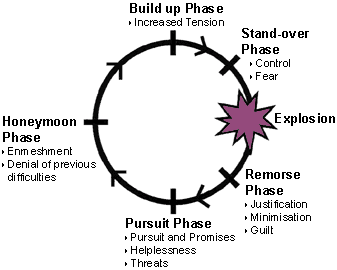Innisfail Domestic Violence Support Service

YOU ARE NOT TO BLAME AND YOU ARE NOT ALONE.
Domestic and family violence often takes place behind closed doors. In the past it was seen very much as a ‘private family matter’ that society should not get involved with. It can be difficult for those who are, or who have experienced violence to come forward because they may feel isolated, ashamed, confused or just too afraid to speak about their experiences. Sometimes they blame themselves for the violence because they have been told by their partner on many occasions, that they ‘provoked’ it.
REMEMBER: No one deserves to be abused. The person being abusive is responsible for their own behaviour. Abuse happens to people from all walks of life, cultures, age and groups.
Everyone has the right to feel safe at home.
Cycle of Violence

Planning for Safety
- Make a list of emergency numbers;
- Arrange a bag of clothes, medications, important documents, keys and cash. Keep the bag in a safe place where your partner cannot find it;
- Inform your children’s teacher/principal who is authorised to pick them up from school;
- Open your own bank account ;
- Discuss with your children what to do if you feel threatened;
- Reassure your children by telling them what is happening, although you may not need to discuss all the details with them .
Domestic and family violence is abusive behaviour used by one person in a relationship to dominate and control another. The abusive behaviour generally has a pattern to it and is repeated. The result is that the person subjected to the violence lives in fear and intimidation.
The following behaviours are some examples of domestic and family violence:
- Physical Abuse such as hitting, slapping, punching, biting, kicking or pushing;
- Damaging property such as the house, breaking the furniture or hurting pets to intimidate or frighten you;
- Threats to harm children, pets, family members or you;
- Forcing you to have sex or take part in sexual acts that you do not want;
- Withholding necessities of life such as food, money, medical care and the company of family and friends;
- Emotional abuse such as making you feel worthless, criticizing your personality, your looks, the way you dress, putting you down, threatening to hurt you, your children or your pets;
- Verbal abuse such as yelling, shouting, name calling and swearing at you;
- Financial abuse such as taking control of the money, not hand over your money, not letting you have a say in how it is spent;
- Stalking such as following you either on foot or by car, constantly calling you by phone, text message or email, staying outside your place of residence or work. Stalking is a criminal o ence in Queensland.
- Social abuse such as controlling where you go, not letting you see family or friends;
- Spiritual abuse such as forcing you to attend religious activities against your will, prohibiting you from participating in religious practices of your choice.
|
|
|
|
|
|
|
|
Some Helpful Numbers
| Police/Fire/Ambo/Emergency | 000 | Innisfail Police | 07 4061 5777 |
| DVConnect – 24 hour DV Helpline | 1800 811 811 | Alcoholics Anonymous | 1300 222 222 |
| Aboriginal and Torres Strait Islander Women’s Legal & Advocacy Service |
07 3392 3177 | Al-Anon Family Groups | 07 3229 2501 |
| Centacare | 07 3252 4371 | Community Support Innisfail | 07 4043 8400 |
| Community Support Tully | 07 4068 3600 | Court House Innisfail | 07 4048 3300 |
| Court House Tully | 07 4068 1065 | Crisis Care | 1800 177 135 |
| Department of Communities | 07 4061 0000 | Immigrant Women’s Service | 07 3846 3490 |
| Kids Help | 1800 551 800 | Lifeline (Counselling Service) | 13 11 14 |
| Legal Aid Queensland | 1300 651 188 | Mensline (9am – midnight 7 days) |
1800 600 636 |
| Men’s Line Australia (24hrs) | 1300 789 978 | Relationships Australia | 1300 364 277 |
| Translating and Interpreting Service | 13 14 50 | Victims of Crime Association | 1300 733 777 |
| Women’s Info Link (Toll free) | 1800 177 577 | Womens’ Legal Service | 1800 677 278 |
This program is funded by the Department of Justice and Attorney General

